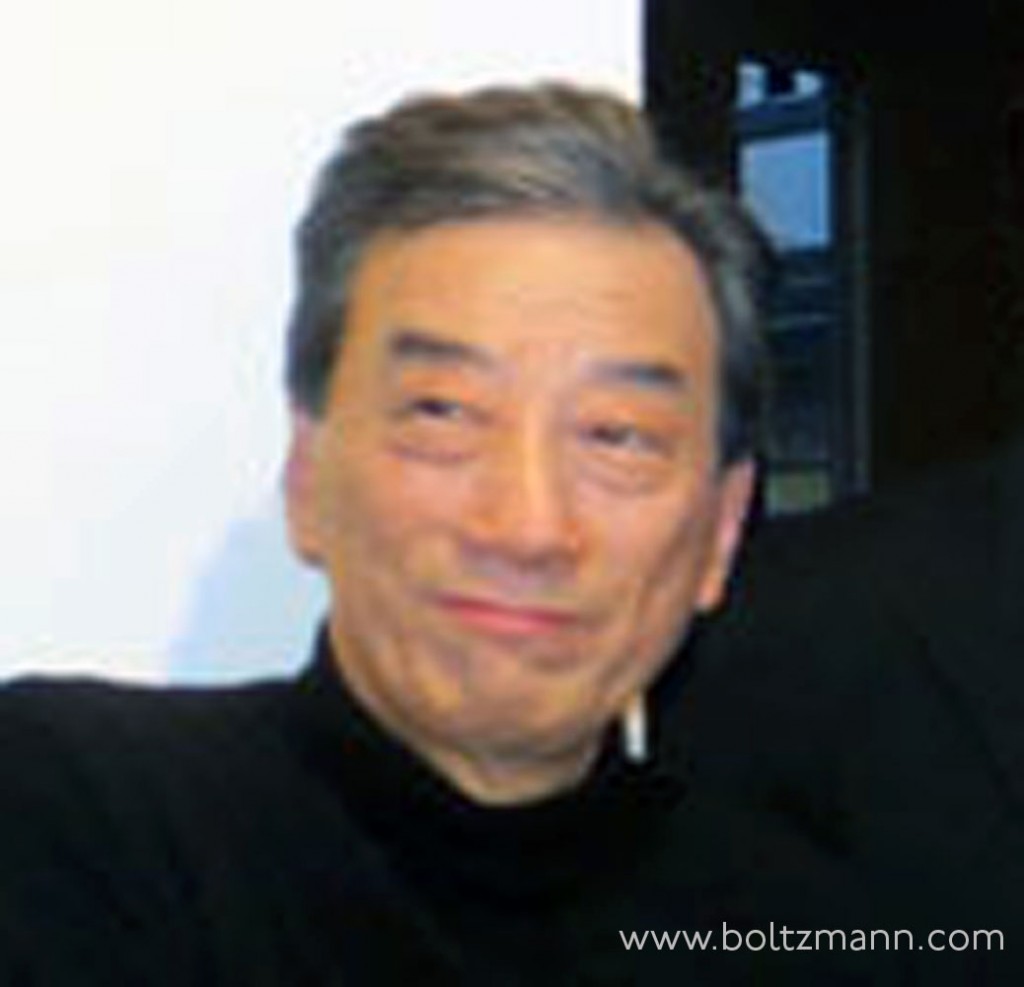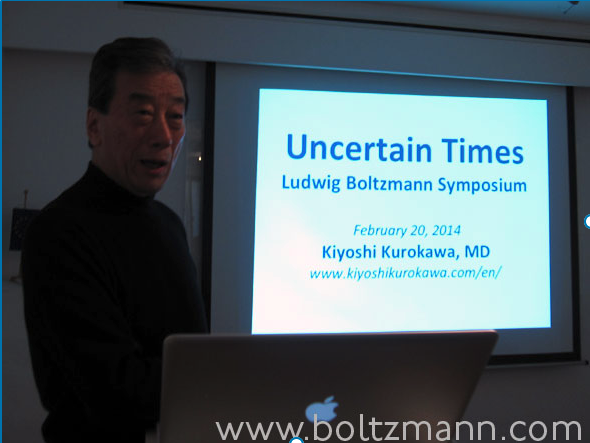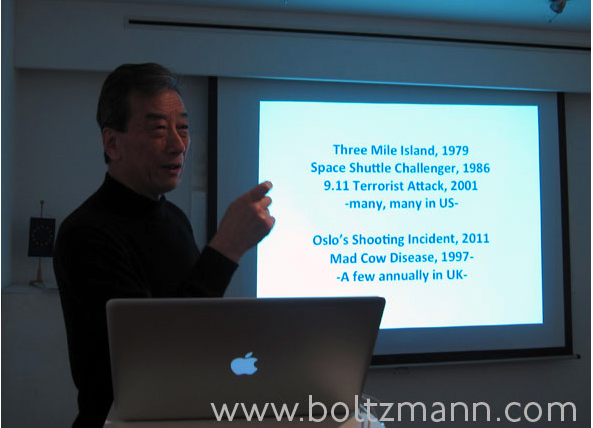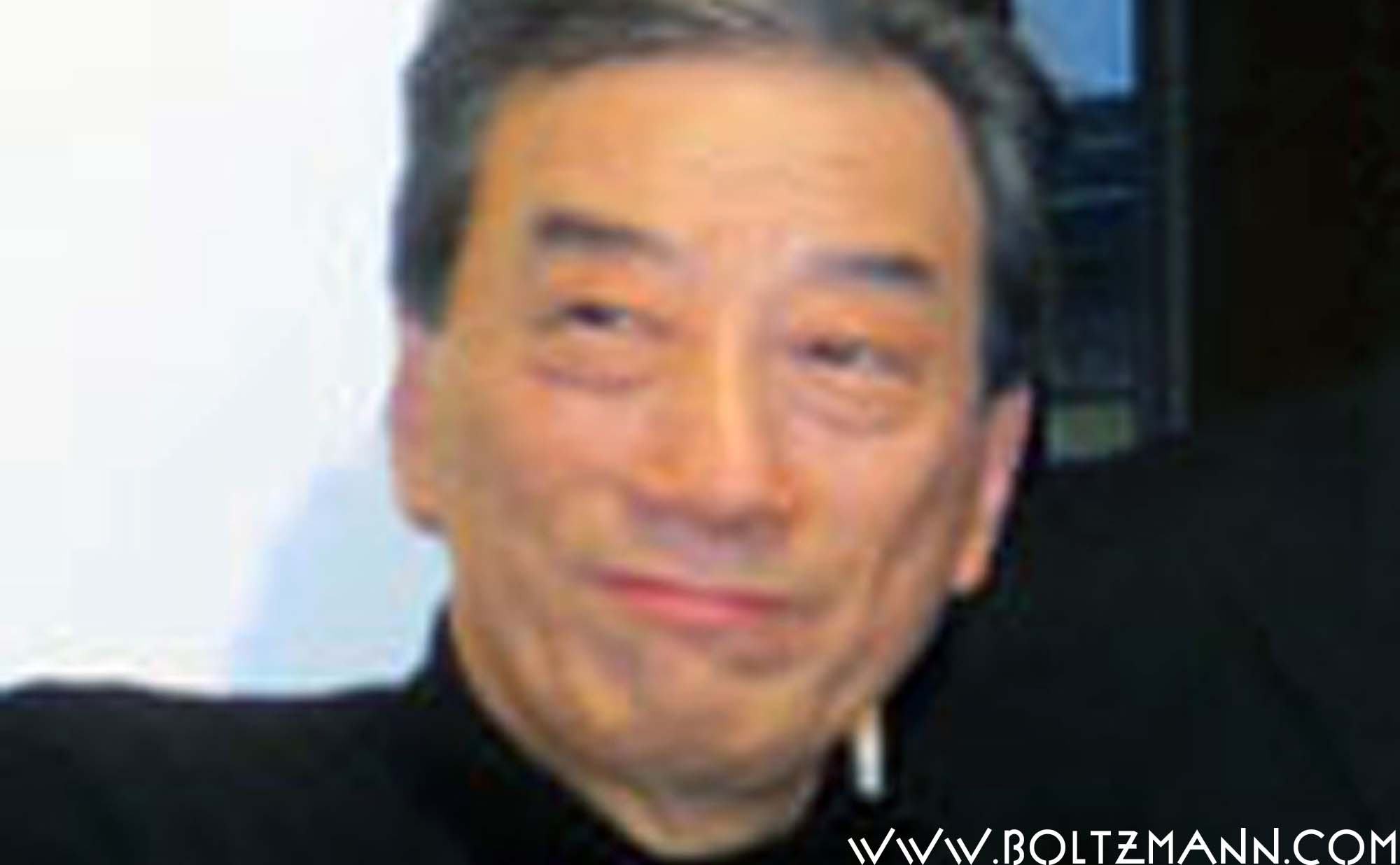Quo vadis Japan? – uncertain times. Groupthink can kill.
Kiyoshi Kurokawa
Keynote presented at the 6th Ludwig Boltzmann Symposium on February 20, 2014 at the Embassy of Austria in Tokyo.
summary by Gerhard Fasol

by Kiyoshi Kurokawa, Academic Fellow of GRIPS and former Chairman of Fukushima Nuclear Accident Independent Investigation Commission by National Diet of Japan
summary written by Gerhard Fasol
Professor Kurokawa set the stage by describing the uncertain times, risks and unpredictabilities in which we live – while at the same time internet connects us all, all while the world’s population increased from about 1 billion people in 1750 to about 9 billion people today.
Major global risks in terms of impact and likelihood are (General Annual Conference 2013 of the World Economic Forum):
- severe income disparity
- chronic fiscal imbalances
- rising greenhouse gas emissions
- cyber attacks
- water supply crisis
- management of population aging
- corruption
Top trends for 2014, ranked by global significance (World Economic Forum, Outlook on global agenda 2014):
- rising social tensions in Middle East and North Africa
- widening income disparity
- persistent structural unemployment
- intensifying cyber threats
- diminishing confidence in economic policies
- lack of values in leadership
- the expanding middle class in Asia
This changing world needs a change of paradigm:
- resilience instead of strength
- risk instead of safety
Many recent “Black Swan events” bring home that:
- accident happens
- machine breaks
- to err is human
Fukushima Nuclear Accident Investigation Commission NAIIC of the Japanese Parliament:
Professor Kiyoshi Kurokawa chaired the Fukushima Nuclear Accident Independent Investigation Commission (NAIIC) by the National Diet of Japan, which was active from December 8, 2011 to July 5, 2012. While Parliamentary commissions to investigate accidents, problems and disasters are quite frequent in most Western democracies, this was the first time ever in the history of Constitutional Democratic Japan, that a Parliamentary investigation commission was constituted.
Examples of Parliamentary commissions in other western democracies are:
- Three Mile Island, USA 1979
- Space Shuttle Challenger, USA 1986
- 9.11 Terrorist Attack, USA 2001 and many many many more in USA
- Oslo’s shooting incident, Norway 2011
- Mad Cow Disease, UK 1997-, and several Parliamentary commissions every year in UK
The records of the Parliamentary Commission for the Fukushima Disaster can be viewed here.
Fukushima Nuclear Accident Investigation Commission of the Japanese Parliament NAIIC key results: Fukushima nuclear disaster was caused by “regulatory capture”
The key result of the Parliamentary Commission is, that the Fukushima nuclear disaster was caused by “regulatory capture”, a phenomenon for which there are many examples all over the world and which is not specific to Japan. Regulatory capture was studied by Goerge J Stigler, who was awarded the Nobel Prize in 1982 for “for his seminal studies of industrial structures, functioning of markets and causes and effects of public regulation”.
Since the full report of the Independent Parliamentary Commission NAIIC is long and complex to read, few people are likely to read the full reports and watch the videos of all sessions.
Therefore short summary videos the key results of the Independent Parliamentary Commission NAIIC were prepared both in Japanese and in English.
The simplest explanation of The National Diet of Japan Fukushima Nuclear Accident Independent Investigation Commission NAIIC Report (English):
1. What is the NAIIC?
2. Was the nuclear accident preventable?
3. What happened inside the nuclear plant?
4. What should have been done after the accident?
5. Could the damage be contained?
6. What are the issues with nuclear energy?
わかりやすいプロジェクト 国会事故調編
1。国会事故調ってなに?
2。事故は防げなかったの?
3。原発の中でなにが起こっていたの?
4。事故の後対応をどうしたらよかったの?
5。被害を小さくとどめられなかったの?
6。原発をめぐる社会の仕組みの課題ってなに?
“Groupthink can kill”
We need leaders to be accountable, and we need to understand that “Groupthink” can lead to disasters.
We need the obligation to dissent instead of compliance.
The Nuclear Accident Independent Investigation Commission (NAIIC) was like a hole body CT scan of the Governance of Japan.
Richard Feynman when charing the Space Shuttle Accident investigation wrote in 1986: “for a successful technology, reality must take precedence over public relations, for nature cannot be fooled.
For his work chairing the Nuclear Accident Independent Investigation Commission (NAIIC) Professor Kurokawa was selected as one of “100 Top Global Thinkers 2012” by Foreign Policy “for daring to tell a complacent country that groupthink can kill”.
Professor Kurokawa was awarded the AAAS Scientific Freedom and Responsibility Award “for his courage in challenging some of the most ingrained conventions of Japanese governance and society.
“Japan is clearly living in denial, water keeps building up inside the plant, and debris keeps piling up outside of it. This is all just one big shell game aimed at pushing off the problem until the future”, New York Times, quotation of the day, September 4, 2013 Professor Kiyoshi Kurokawa


Copyright 2014 Eurotechnology Japan KK All Rights Reserved

Leave a Reply